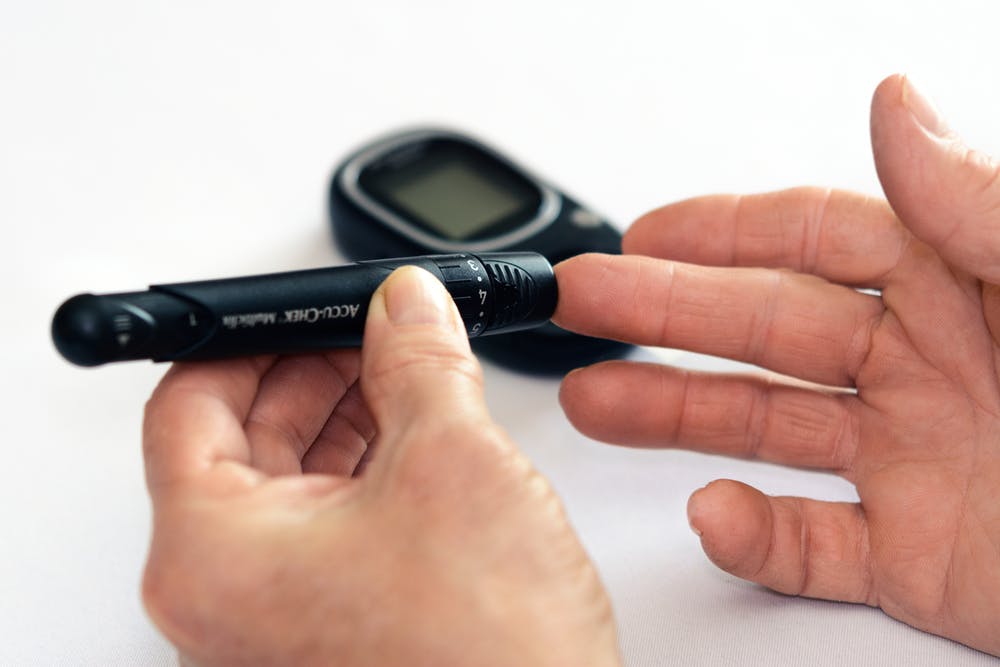nalco group
bone, muscle & joint pain physio
BOOK NOW / WHATSAPP ABOUT YOUR PAIN OR INJURY
- NOVENA 10 Sinaran Drive, Novena Medical Center #10-09, Singapore 307506
- TAMPINES 9 Tampines Grande #01-20 Singapore 528735
- SERANGOON 265 Serangoon Central Drive #04-269 Singapore 550265
Home > Blog > Physiotherapy > Conditions > Diabetes Physiotherapy
Diabetes Physiotherapy

Diabetes is a health medical condition in which the patient's body either does not produce enough of the hormone insulin, or the cells in the body do not react normally to insulin. When either of these conditions occurs, it causes the level of glucose (sugar) in the blood to become too high.
High blood glucose can cause many health problems.
In 2012, nearly 30 million Americans, or 9.3% of the population, had diabetes. Only an estimated 21 million Americans currently know they have diabetes; another 8.1 million may be unaware that they have the disease.
Diabetes rates are almost double for Native Americans and African Americans.
About 86 million Americans have "prediabetes," a condition in which blood glucose levels are abnormal but are not yet considered diabetic. In 2010, diabetes was the seventh leading cause of death in the United States. Worldwide, 382 million people were known to have diabetes in 2013.
Unfortunately, diabetes can affect anyone at any age, and can be related to physical problems such as
- weakness
- loss of endurance
- obesity
- balance problems
- sedentary lifestyle
Physical activity and exercise are important and effective ways to lower high blood glucose levels.
Our senior physiotherapists help people with diabetes improve or avoid related problems, and can teach sedentary people how to add physical activity to their daily lives in safe, effective, and enjoyable ways.
What Is Diabetes?
Diabetes, also known as diabetes mellitus, is a medical condition and disease in which the body does not produce, or properly use, insulin. Insulin is a hormone produced by the pancreas that allows glucose (sugar) to enter cells and provide the necessary energy for daily activities.
When our pancreas doesn't produce enough insulin, or when muscle, fat, and liver cells don't properly respond to insulin, glucose builds up in the blood (hyperglycemia). This can be toxic to cells throughout the body.
And because the cells don’t have enough glucose to use for energy, the cells use an abnormal amount of fats for fuel (ketoacidosis) and may become undernourished.
There are 3 types of diabetes:
- Type 1 diabetes develops most
often in children and young adults. The immune system destroys
insulin-producing cells (beta cells) of the pancreas.
- Type 2 diabetes can develop at any age and is
usually preventable. The cells of the body become resistant to insulin,
and the pancreas can't produce enough insulin to override the
resistance.
- Gestational diabetes develops in women during pregnancy. This condition occurs more often in African Americans, Native Americans, Hispanic Americans, and women with a family history of diabetes. It is also associated with obesity and inactivity.
Although the exact cause of diabetes is unknown, factors such as poor diet, obesity, and lack of exercise play important roles in developing type 2 diabetes.
Complications of all types of diabetes can include:
- Heart disease
- Heart attack
- Stroke
- High blood pressure
- Retinopathy (eye disease)
- Vision problems
- Blindness
- Kidney disease
- Neuropathy (nervous system disease)
- Foot pains and hand pains
- Inner-ear nerve damage, which causes balance problems
- Peripheral vascular disease
- Reduced muscle strength and physical function
- Kidney disease
- Skin problems, including sores, ulcers, and infections
- Cell death (necrosis), particularly in toes and feet
- Amputations
- Premature death
A related condition is called "prediabetes" or "insulin resistance." Blood sugar levels are normal or only moderately elevated and often are accompanied by elevated insulin levels, but have not yet reached the diabetic stage. With prediabetes, you have a greater risk not only for diabetes, but for heart attacks and strokes.
diabetes Signs and Symptoms
Signs of diabetes include:
- Slow-healing sores
- High blood pressure
- Frequent infections, such as gum or skin infections and vaginal or bladder infections
- Unexplained weight loss
Diabetes symptoms include:
- Increased thirst
- Frequent urination
- Constant or extreme hunger
- Fatigue
- Sweating
- Tingling, burning, or numbness in feet and hands
- Blurred vision
- Pain in joints or muscles
- Cramping in the legs when walking
- Pain or limping with walking
- Weakness
- Chronic pain / persistent pain
How Is diabetes Diagnosed?
Diabetes is diagnosed by a doctor, based on a test of your blood glucose level.
This test is often ordered by a doctor when a person reports some of the signs and symptoms listed in the previous section, or has risk factors determined by the doctor.
If you are diagnosed with diabetes, our senior physiotherapists can evaluate your symptoms and problems associated with the condition. We will identify physical problems that can be helped with an individualized exercise program, and provide specialized treatments based on your needs and goals.
how our senior physiotherapists can help
Our senior physiotherapists help people with diabetes
- participate in safe, effective exercise programs to improve their ability to move
- perform daily activities
- reduce their pain
- possibly lower their blood glucose levels
Physiotherapy treatments also can help people with diabetes heal any associated skin problems faster than they would without treatment.
We will examine your record of blood glucose levels, and will check your skin for wounds. We will conduct a complete assessment of your strength, flexibility, endurance, and balance, and use the results of the testing to design an individualized treatment program that addresses your problems and needs.
Your physiotherapy treatment program can help improve your:
Motion. We will choose specific activities and treatments to help restore normal movement. These might begin with “passive” motions that the physical therapist performs for you to gently move your joints, and progress to “active” exercises and stretches that you do yourself.
Strength. We will choose and teach you the correct exercises and equipment to use to steadily and safely restore your strength.
Flexibility. We will determine if any muscles are tight, begin to help you gently stretch them, and teach you stretches that you can do yourself.
Endurance. Regaining your endurance is important. If you are suffering from weakness due to inactivity, we will teach you exercises to improve endurance, so you can return to your normal activities.
Balance and coordination. Regaining your sense of balance is important in order to prevent falling. We will teach you exercises to improve your balance ability. Coordination is also essential for daily and work activities. We can teach you exercises and movements that restore your coordination.
Walking ability. We can improve your walking ability and comfort by adjusting and refitting your shoes, or by adding shoe inserts or orthotics that support your feet and ankles. We can teach you to use support equipment, such as walkers and canes, to help you walk safely.
Pain levels. Physiotherapy treatment is a safe way to treat chronic pain. We may use different types of treatments and technologies, and choose the most effective and safe exercises for you to perform to control and reduce pain. If you have diabetic nerve pain (neuropathy), we can teach you how to protect painful areas and make them less sensitive.
Blood glucose levels. Physical activity, such as prescribed exercise, can help lower your blood glucose levels. We can design a safe, individualized exercise program for you to help control and lower your blood glucose levels each day.
Healing of sores. Our senior hand therapists can apply different types of bandages, dressings, lotions, and wound treatments to help sores heal faster than they would on their own. We also may check your footwear for proper fit and overall condition, and teach you to perform daily foot and skin checks to prevent wounds, sores, and blisters from developing.
Home exercise. We will teach you strengthening, stretching, and aerobic exercises to perform on your own at home. These exercises will be specific for your needs; if you do them as prescribed by us, you can accelerate your recovery.
Ability to perform daily and work activities. We will discuss your activity goals with you and use them to set your recovery goals. Your treatment program will help you reach your goals in the safest, fastest, and most effective way possible.
Always talk with our senior physiotherapist before you begin an exercise program that addresses your diabetes symptoms.
If Surgery Is Required
If a part of your body, such as your foot or lower leg, becomes too damaged by high blood glucose levels and the effects of diabetes requires amputation, we can help you prepare for surgery and recover from it afterward.
Our senior physiotherapists can help you
- manage pain
- heal faster
- learn how to use any needed prosthetics
- regain your
walking ability and
- get back to being physically active as soon as possible.
